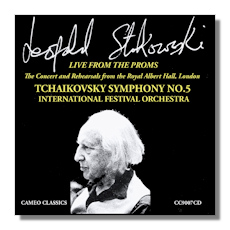
The Internet's Premier Classical Music Source
Related Links
- Tchaikovsky Reviews
- Latest Reviews
- More Reviews
-
By Composer
-
Collections
DVD & Blu-ray
Books
Concert Reviews
Articles/Interviews
Software
Audio
Search Amazon
Recommended Links
Site News
 CD Review
CD Review
Piotr Ilyitch Tchaikovsky

Live From The Proms
- Symphony #5
- Rehearsal excerpts
International Festival Orchestra/Leopold Stokowski
Cameo Classics CC9007CD 79:42
For personal reasons I am going to start with a discussion of the rehearsal excerpts. They last for almost 38 minutes and are fascinating. Rehearsal is the essence of any performance. I have been teaching for 36 years and I know how important preparation is to the final gestalt. When I teach the same lesson over the course of a day each period is a kind-of rehearsal up to the last class. I can see how the lesson evolves (and that word best describes what happens) and gets better as I go from period to period. Listening to Stokowski's comments and to the orchestra's response you can feel the performance taking shape.
As usual with Stokowski there are long periods where he doesn't stop the orchestra and may just shout "good… thank you!" as they play. When he does stop the orchestra it is no-nonsense. His comments are to the point and free of jargon. For example, in the first section he says, "Faggot, too loud." They play for a bit, he stops the orchestra and repeats himself, "Faggot, I asked for soft… please do better." Then you can hear the faggot (bassoon) playing softer.
His comments are always practical as well. For example, he tells the brass to play with their bells down for a diminuendo or up at other points. At another point he tells the strings to play up-bow. Then he goes on to say that 'it may be printed down-bow… damn the printers.'
The rehearsal is pure Stokowski. At another place he says, "The conductor asked for an accent… you didn't do it because you weren't listening to the conductor… Some conductors do exactly what is printed and some use their imagination. As soon as you recognize what kind of conductor you have, you learn also about human beings. One is like a machine; this one has heart.
Only at one point does he get angry. He stops the orchestra, pounding on the podium, and yells, "NO! Watch conductor! You're playing mechanical!" After a pause he adds, "I am the nuisance, you can put up with me.
Through out it all you can hear the orchestra change its sound. This is particularly telling as Stokowski rehearses them leading into the coda. As my readers well know, Stokowski eliminated the pause before the coda, having a timpani and drum roll lead into it instead. You can hear them changing how they are playing it (more on that anon).
Okay, you are getting impatient. What about the performance and recording? Bear with me one more paragraph.
I have come to the conclusion that Tchaikovsky's 5th Symphony was Stokowski's favorite. This is based on the fact that from 1910 to 1937 he conducted the work almost 30 times compared with significantly less for the 6th (less than five) and 4th (less than 20). In addition to that there is the number of live performances now on disc (five in the archive) and the fact that he chose it as the opening for the movie "100 Men and a Girl".
It was only a month or so ago that I was reviewing another live performance of Stokowski conducting what I said was arguably the best Tchaikovsky 5th I have heard. Then this one arrives and I have to change my recommendation. This performance is even better than the Detroit Symphony one in 1952. The sound is warmer with air around the music. The solos are even better detailed. The performance is simply amazing and the fact that Stokowski was 91 just boggles the mind. That timpani/bass drum roll into the coda that I referred to above, is riveting. Stokowski's answer to the question posed in the opening is stirring and affirmative. The whole thing has a Russian feel to it.
There's no need to go on. This is a MUST HAVE for those who appreciate Stokowski's music making and an OUGHT TO HAVE for anyone else.
Copyright © 2007, Robert Stumpf II


















